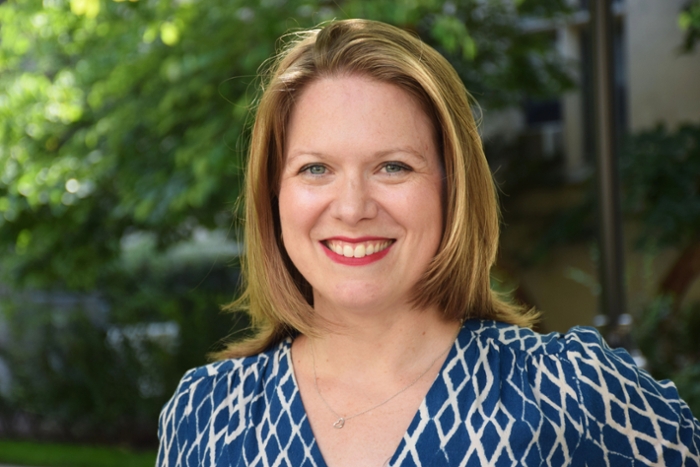Faculty Spotlight: Beth Tipton
IPR statistician finds her calling in “social statistics”
Get all our news

IPR fellow Beth Tipton studies statistics and explores how they can be used for social good across disciplines.
IPR statistician Beth Tipton spent the first three years of her career living and working in the Navajo Nation near Gallup, New Mexico, for the Girl Scouts and a local university.
“I was very hungry in my early 20s to make the world a better place,” Tipton recalled.
It was also where she first realized that as a statistician she could use math for the social good.
An undergraduate math major with a master’s in sociology, she applied her quantitative skills to pulling census data for the Navajo Nation to better understand the community the Girl Scouts served, developed a new placement testing system for writing courses at the university, and created a database to study how students moved through the developmental course sequence. Applying to become a statistician for the Navajo Nation helped her realize what she wanted to do with her life.
“I noticed in my jobs that I kept coming up with ways to make data part of the job, even though they weren't part of the job,” she said.
Something she thought of as “social statistics” would become a path to helping others through using data to make good decisions and policies—just what this self-described “nerdy math kid” had always wanted to do.
Tipton found Northwestern provided exactly what she needed to proceed: strong statistics, education, and social science departments and interdisciplinary cooperation through IPR. She received her PhD in statistics in 2011 and completed a pre-doctoral fellowship in the Multidisciplinary Program in Education Sciences (MPES).
After seven years as a faculty member at Columbia University’s Teachers College, Tipton returned to Northwestern as an associate professor and to IPR as a faculty fellow.
Generalization and the ‘Generalizer’
Teaching undergraduates—the next generation of statisticians—has helped Tipton to “think about the future of statistics.” If we want to use evidence well, we have to be sure that an experiment’s effects will apply—can be generalized—beyond the specifics of that one study, she explained.
For example, if a new drug works well on men, will it work just as well on women? Will an education program work similarly in an under-resourced rural school as it does in a Chicago public school?
Tipton studies how to make experiments better for such generalization: How should researchers plan studies, recruit subjects, and estimate an experiment’s treatment effect?
“Once you recognize that treatment effects might vary, then that fundamentally changes what the goal of an experiment is,” she noted.
Tipton wanted to help researchers create more generalizable experiments in a practical and accessible way. With a Spencer Foundation grant, she created a web-based, user-friendly tool for K–12 education researchers called the “The Generalizer” in 2015. In less than an hour, users receive a zip file that lists appropriate schools and directions for recruiting a population for their experiments.
With an Institute of Education Sciences grant, Tipton and Jessaca Spybrook of Western Michigan University are now working on The Generalizer 2.0, which will allow researchers to add their own data. They also are adding power analysis, which determines the level of confidence the researcher has in the sample size and effect size, to the Generalizer to make it a one-stop shop for planning studies.
Meta-Analysis
For Tipton, meta-analysis can be thought of as a multisite trial, or “another way we make generalizations.” Meta-analysis pools multiple studies, rather than multiple experimental sites, and determines how consistent the effects are across all of them.
She is especially interested in estimation when there are many different effect sizes per study. Her technical work on this issue has led her to think about how to best explain variation in effect sizes using “meta-regression”—regression in the context of meta-analysis.
She continues her collaboration on meta-analysis that began when she was a graduate student of IPR education researcher and statistician Larry Hedges,whom she first met when they were both at the University of Chicago.
Tipton and another former IPR graduate research assistant, James Pustejovsky, now at the University of Texas at Austin, are also working together on meta-analysis, a research partnership they began as Northwestern PhD students. They just finished a paper on the history of meta-regression methods and another on current practice in meta-regression. They hope that these broad overviews of “consensus points and the problems” will encourage better practices in the field, Tipton said.
‘Using Statistics to Improve Policy’
The ultimate question Tipton asks in her research is, “How do I use statistics to improve policy?”
Her work across disciplines demonstrates her guiding principle.
She is a founding member of the Mindset Scholars Network, which includes IPR social psychologist Mesmin Destin. The network sponsored the National Study of Learning Mindsets, a randomized controlled trial of the effect of a growth mindset intervention on 9thgraders in the United States. Tipton was part of the team that designed the study, which included both random sampling and random assignment, an innovative and rarely attempted combination.
“It’s been an interesting space to think about how to change practice and how to integrate best practices from one field to other fields, and how to actually build those connections that make work more generalizable,” she said.
Tipton finds her return to IPR’s interdisciplinary collaborative community stimulating, motivating, and enjoyable for similar reasons.
“It is a truly interdisciplinary environment,” she said. “It’s a bunch of people who care about the world and about making life better for disadvantaged people. There’s this overriding mission of doing my work in some way to make the world a better place, and I like that.”
Beth Tipton is an associate professor of statistics and an IPR fellow.
Published: March 5, 2019.


